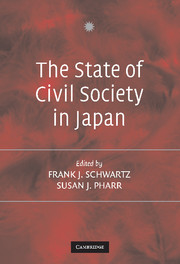Book contents
- Frontmatter
- Contents
- Tables and Figures
- Contributors
- Preface
- The State of Civil Society in Japan
- PART I CONTEXT
- PART II THE ASSOCIATIONAL SPHERE
- PART III THE NONMARKET ACTIVITIES OF ECONOMIC ACTORS
- 8 Redefining the Conservative Coalition: Agriculture and Small Business in 1990s Japan
- 9 The Death of Unions' Associational Life? Political and Cultural Aspects of Enterprise Unions
- 10 The Struggle for an Independent Consumer Society: Consumer Activism and the State's Response in Postwar Japan
- PART IV STATE-CIVIL SOCIETY LINKAGES
- PART V GLOBALIZATION AND VALUE CHANGE
- Bibliography
- Author Index
- Subject Index
9 - The Death of Unions' Associational Life? Political and Cultural Aspects of Enterprise Unions
Published online by Cambridge University Press: 05 July 2014
- Frontmatter
- Contents
- Tables and Figures
- Contributors
- Preface
- The State of Civil Society in Japan
- PART I CONTEXT
- PART II THE ASSOCIATIONAL SPHERE
- PART III THE NONMARKET ACTIVITIES OF ECONOMIC ACTORS
- 8 Redefining the Conservative Coalition: Agriculture and Small Business in 1990s Japan
- 9 The Death of Unions' Associational Life? Political and Cultural Aspects of Enterprise Unions
- 10 The Struggle for an Independent Consumer Society: Consumer Activism and the State's Response in Postwar Japan
- PART IV STATE-CIVIL SOCIETY LINKAGES
- PART V GLOBALIZATION AND VALUE CHANGE
- Bibliography
- Author Index
- Subject Index
Summary
Although discounted by some theorists of civil society, labor unions can offer a rich associational life for their members by performing political and social as well as purely economic functions. The potential of labor unions as civil society actors was demonstrated by the crucial role played by Solidarity in reviving civil society in Poland. What role have labor unions played in Japan's civil society? Have they succeeded in establishing their own sphere of activities relatively autonomous from management and the State? To examine this question, I focus here on the political and cultural aspects of labor unions. On the basis of a historical analysis of an enterprise union in one of the major steel firms, I demonstrate that labor unions failed to establish either internal democracy or their own organizational culture distinct from corporate culture. These political and cultural aspects of unions constitute what I call their “associational life.” Labor unions in postwar Japan made some significant achievements in their economic activities, winning wage increases and employment security for their members. They nevertheless failed to become important actors in civil society because their associational life came to be dominated by and incorporated into corporate society (kigyō shakai), by which I mean the hegemony of corporate management and the integration of workers as members of corporate communities rather than as Citizens of political society as a whole.
First, I outline the history and organizational characteristics of Japan's labor unions. Second, I consider the conditions under which labor unions can play a significant role in civil society.
- Type
- Chapter
- Information
- The State of Civil Society in Japan , pp. 195 - 213Publisher: Cambridge University PressPrint publication year: 2003
- 1
- Cited by



